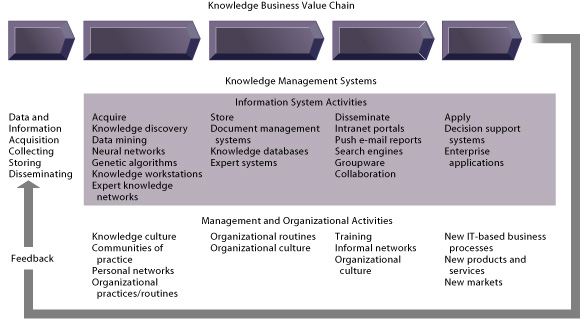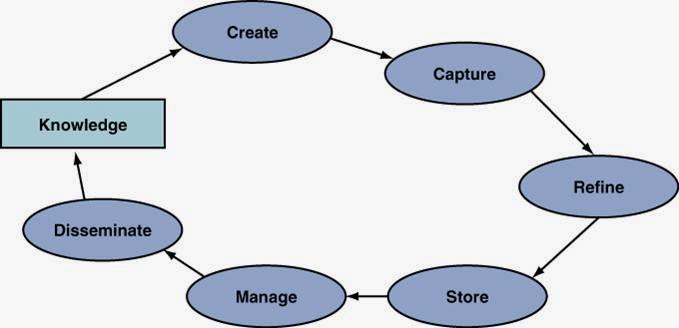Knowledge management refers to the set of business processes developed in an organization to create, store, transfer, and apply knowledge. Knowledge management increases the ability of the organization to learn from its environment and to incorporate knowledge into its business processes. Following figure illustrates the five value-adding steps in the knowledge management value chain. Each stage in the value chain adds value to raw data and information as they are transformed into usable knowledge. In the figure, information systems activities are separated from related management and organizational activities, with information systems activities on the top of the graphic and organizational and management activities below.… Read the rest
Knowledge Management
Knowledge-Sharing Dilemmas in Organizations
Information being exchanged amongst the workers of an organisation is a system that has been an essential constituent of the procedure of knowledge management. With the introduction of the contemporary information and communications technology within corporations, it has become very convenient and has also become a valuable support function to make such exchanges possible by reducing the obstructions of time and distance. On the other hand, those corporations that have invested in technologies of this kind are frequently faced with the complications of inducing the workers to utilize the purpose of those technologies in order to communicate their knowledge and perceptions.… Read the rest
Knowledge Management Cycle
In today’s business scenario where there is lot of competition, only source of lasting is Knowledge. It is argued that knowledge management is a necessity due to changes in the environment such as increasing globalization of competition, speed of information and knowledge aging, dynamics of both product and process innovations, and competition through buyer markets. Knowledge management promises to help companies to be faster, more efficient, or more innovative than the competition. Also, the term ‘‘management” implies that knowledge management deals with the interactions between the organization and the environment and the ability of the organization to react and act
Various researchers then gave the various definitions on Knowledge Management and still it’s the buzzword today.… Read the rest
The Technology Push for Knowledge Management
The concept of knowledge itself is not new, because the need and importance of knowledge has been the basis for the development of various cultures, philosophies and religions. What has really made it possible for people and even organizatins today to even contemplate harnessing knowledge energies for better management has been the rapid evolution in technology that we have seen over the last decades.
The role of technology, particularly information technology in defining and revitalizing corporate strategy has evolved over the last forty years or so. In the 1960s and 70s, computers were confined to glass cabins and sometimes as departmental number crunches.… Read the rest
Knowledge – Definition and Types
Knowledge is a very slippery concept with many different variations and definitions, each of which is valid in its own right. The nature of knowledge and what it means to know something are epistemological questions that have perplexed philosophers for centuries and no resolution looms on the horizon.
According to Webster’s Dictionary, knowledge is “the fact or condition of knowing something with familiarity gained through experience or association”. In practice, though, there are many possible, equally plausible definitions of knowledge. A frequently used definition of knowledge is “the ideas or understandings which an entity possesses that are used to take effective action to achieve the entity’s goal(s).… Read the rest
Approaches to Knowledge Management Practice
There are two fundamental approaches to knowledge management practice, tacit and explicit approaches. The approach of tacit knowledge accents understanding the individuals king of knowledge in an organisation make the people to transfer knowledge within the organisation, the people managing the key as knowledge carriers and creators. The approach of explicit knowledge explains marches for express knowledge applied by one person, the pattern of organisation approaches for invention of new knowledge, and including information systems (development of systems) to distribute and express knowledge within the organisation. The comparative merits and demerits of both tacit and explicit approaches to knowledge Management are explained here.… Read the rest


